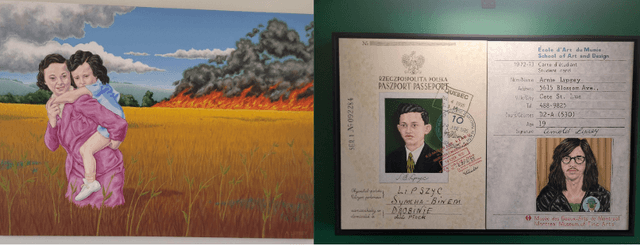The Torah is scattered with references to sons’ undisputable rights to their fathers’ estates. However, there is little discussion about what happens if a man only leaves behind daughters. Numbers 27:1-11 fills this role. The verses outline the story of the five daughters of Zelophedad, who approached Moses to advocate for their right to inherit their father’s portions of land. Not once in these ten verses, though, is there any background or perspective on how the daughters developed their plan or how they felt while talking to the leader of the Jewish community. I endeavor to fill these gaps in my short story and lend insight into the five sisters’ viewpoints.
The desert felt especially endless at twilight. Freedom seemed to be sprinkled between grains of sand; self-determination lay just beyond the waning horizon. Standing there as the sun abandoned its post for the night, all Malcah wanted to do was sift for her independence. She was willing to run and leap off the edge of the earth, knowing her and her sisters’ liberation would catch and cradle her. But the time had yet to come. It was certainly not now, with her apron dusted with flour and her arms stacked with wood. She would need to be careful and calculating about how she approached the matter.
Malcah had not been raised to be meek. Her father had raised her and her sisters like sons. Zelophedad taught them how to hunt the quail that blanketed their camp in the evenings. Once dinner had been brought down from the sky, he would stand next to them, engaging in debates as they plucked and slaughtered the bird. He considered their opinions equally. He listened to Malcah when she stated she and her sisters did not wish to marry unless her future husband would give her freedom. In the following years, he declined each marriage offer for his daughters. He would not cut away their independence, their ancestral right. They could not exist in a marriage with a husband who would not value their voice. The idea of his beloved, outspoken daughters being beaten because of their desire for autonomy was unbearable. As the years passed and his daughters grew older, Zelophedad accepted that no man may ever fit these demands (Bamidbar Rabbah, 21:11).
Time escaped Malcah as she stared into the sky. By the time Tirzah, the youngest of her five sisters, called to her from the camp, stars shone from their lofty perches. Wood was needed quickly; the fire baking the challah for tomorrow night’s meal was fading into embers. She hurried back, leaving a trail of twigs in her wake.
After the evening chores had been completed, Malcah crept to her mother’s side of the tent. She glanced at Yocheved, curled on her mat, and then beckoned for her sisters to follow her out of the tent. No’a, Hogalah, Milcah, and Tzirah huddled around a candle planted in the sand, starting at Malcah. As the eldest, she had always been the leader. With their father’s early death, Malcah had taken this role on with greater vigor, attempting to fill every space he left.
“I have an idea,” Malcah whispered. “We must convince the elders that we deserve Father’s five portions of land in Eretz Yisrael (Bava Batra, 8:3). We must make our argument carefully. We must pick our timing wisely. We must ensure our case is thought out, clear, and indisputable. If we do this, we will be granted our freedom”(Bava Batra 119b:5).
Hogalah leaned forward. “Dear sister, liberation is a luxury we cannot afford. We lost our father and, with him, the land. Our only option is to marry. If we do not, we shall be destitute. The time has come for us to end this frivolity. ”
“No!” cried Malcah, “I refuse to believe we cannot gain our land back. We will sit and consider. We will study and interpret laws until we create an unwavering argument” (Bava Batra, 119b:11). Noah and Hogalah glanced at one another. Milcah and Tzirah dared not speak. They had all been resigned to their fate. Why could Malcah not do the same?
Malcah was relentless. Every afternoon she would sneak behind the men’s learning tent, eager to hear any wisdom or interpretations that may help her. Sometimes, the men's voices would drone. Their words would weave themselves together, knitting a soothing, rhythmic lullaby until Malcah found herself asleep. She would wake up curled in the dust, nestled in the shadow of a looming tree.
One cool afternoon, Malcah awoke shivering. She crawled out of the tree's shadow, seeking sun-warmed sand. As she rose, ready to return to her tent, she heard a voice call to her. In her dash for heat, Malcah had been careless. She was standing, apron full of dust, sand tangled in her hair, in front of the open flap of the men’s tent. Moses, the teacher, stared at her, eyes full of bemusement. He called to her, “Come in, child. Anyone who has troubled themselves to be so filthy with sand must have a question worth hearing.” Malcah stumbled in. It was unbelievable to be a woman in the men’s place of learning.
“Moshe Rabenu, I would like, if you could tell me, to know the laws of inheritance and widowing. My mother, Yocheved, is a widow. Knowing more about her situation would benefit me greatly.”
“My child, there is much I can tell you. I will explain all I have so far understood to you.” Malcah sat, listening in rapture as Moses detailed the laws he had been given on Mount Sinai. As one law flowed from Moses’s mouth, sparks began to fly before her eyes. Here was her key. She pressed on it, trying to comprehend and interpret. Malcah and Moses talked and learned until dusk began to creep into the tent. She wanted to stay, but Malcah could hear Tirzah calling her. As she left, Moses once again stared at her. “My child, your questions were not ones I could answer after just a few moments. I must spend the next seven days interpreting. Come back in two weeks, and I will try to satisfy your curiosity.”
***
Four months had passed since the sister’s initial clandestine meeting. Once again, the sisters of Malcah sat, the candle’s light illuminating their graying hairs. Their leader, the eldest, their redeemer, conveyed what she had discovered in hushed tones. Her plan was detailed and clear but risky. What if it did not work? But what if it did? When Malcah had finished, she locked eyes with each sister.
Hogalah spoke up first, “It is too dangerous. We are women, we have a place and it is clear. We do not speak to the men of the court, we do not interpret holy words. We sit and we accept what we are given. To be a pious woman is to accept this role.”
At this, Tirzah spoke up, “Sister, I disagree. Think of Miriam, the most righteous woman of all. Had she accepted what she had been given in Egypt, the Israelites would never have escaped; the Hebrews would have been destroyed. Malcah is right. If we can pave our own way to freedom, why not try?”
Hogalah glanced at the other sisters, waiting for them to defend her. Noah shook her head. Milcah was silent. Hogalah sighed, “If my other sisters concur, who am I to disagree? Malcah, we shall do as you say.”
The sisters of Malcah, of the Manassite family—daughter of Zelophedad, son of Hephner, son of Gildead—guided by Malcah, stood before Moses, Eleazar the Priest, the chieftains, and the whole assembly at the entrance to the Tent of Meeting.
Malcah stepped in front of her sisters and cried, “Our father died in the wilderness. He was not of the faction, Korah’s faction, which banded together against Adonai, but died for his own sin; he has left no sons. Let not our father’s name be lost to his clan just because he had no son! Give us a holding among our father’s kinsmen”(Numbers, 26:1-4)
Noah continued, “You are studying the portion which states that if a brother dies and has not had offspring, then his wife must marry his brother and enter a levirate marriage. Our mother has not been required to do so. Therefore, we must be considered as sons and given an inheritance. Otherwise, our mother should be required to enter a levirate marriage” (Bava Batra, 119b:10).
Moses scrutinized their logic and interpretation. They were right. Malcah, a clever one, had taken his teachings and crafted an ironclad case. But such a change in the law required a ruling from the Heavens. He brought their case before Adonai, who ruled, “The plea of Zelophedad’s daughters is just: you shall give them a hereditary holding among their father’s kinsmen. If a man dies without leaving a son, you shall transfer his property to his brother” (Numbers, 26:5-7).
The sisters of Malcah smiled. Malcah’s wisdom (Bava Batra 119b:9) and interpretation had freed them. The land of Israel now held the promise of opportunity.
But the matter had not yet been resolved. The family heads of the clan of Manasseh appealed to Moses, the chieftains, and the family heads of the Israelites, “If the Daughters of Zelophedad become the wives of persons from another Israelite tribe, their share will be cut off from our ancestral portion and be added to the portion of their husband’s tribe, diminishing our portion. During the jubilee year, their land will not return to ours. Their share will remain cut off from the ancestral portion of our tribe. This infringes upon our rights to the Land of Israel.”
Moses again brought the case before Adonai, who stated, “The plea of the Josephite Tribe is just.” Moses spoke to the court, “The daughters of Zelophedad must become wives within a clan of their father's tribe to ensure the shares remain united with Mennash’s ancestral land” (Numbers, 36:1-6).
Malcah felt her heart disintegrate into grains of sand. Gone were the dreams of total liberation. She and her sisters had waited years to find a husband. They had turned their noses up at every proposal, spurned the men who asked for their hands. All because no one would give them what they wanted. They desired not wealth or respect but liberation. But no man in all the twelve tribes had ever been able to offer them that, and now their options had been further narrowed. Shadows of disappointment flitted across Malcha’s sisters’ faces, but none were as crushed as her. They were not the leaders who had charged into battle praying for a clean victory. Malcah had been ready for complete change. She had been ready for complete freedom. How funny it was to be a woman. One moment, freedom brushes one's fingertips, and the next, it is snatched away.
Powered by Froala Editor






